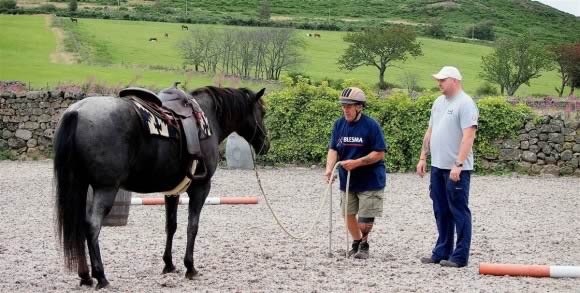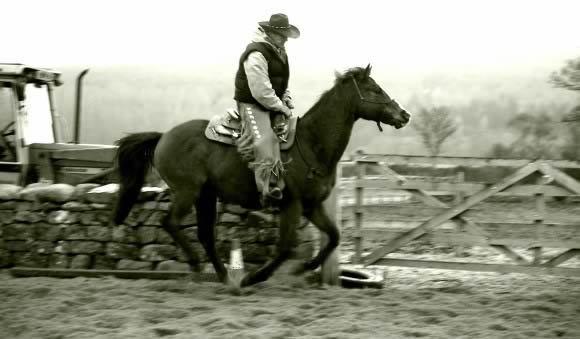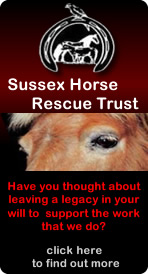
Horseytalk.net Special Interview
Geoffrey Riddle
How horses are helping severely wounded servicemen find not only solace, but confidence, brotherhood and a way back from the brink to a successful non-military life
Talking to former Royal Marines officer Jock Hutchison, you would never know he is currently nursing nine broken ribs and a patched-up punctured lung.
Until he tells you.
The 52-year-old's injuries are a result of taking retired sprinter Peopleton Brook for a spin at an empty Haydock Park.
There, he opened up the nine-time winner formerly trained by Brendan Powell like a Ferrari at Donnington Park, and on the bend the horse just stopped. He did not.
Hutchinson's injuries are minor, however, in comparison to the hundreds of former military service personnel he has helped to rehabilitate using Peopleton Brook and American Quarter horses through his charity HorseBack UK at his farm in Scotland.
Through a programme he calls Mobility With Dignity, severely wounded servicemen come up to his farm to find not solace, but confidence, brotherhood and a way back from the brink to a successful non-military life.
They stay on the farm in groups of eight and a minimum of two of those have been through the process before and act as mentors. They cook for themselves, they eat together and get back into being in a team environment.
It takes a bit of a mental leap to get back into the working routine of looking after horses, but doing so instills discipline and a team ethic back in those taking part.
"My injuries are nothing," Hutchison says matter-of-factly. "You wake up back in Britain from somewhere like Afghanistan and from there it is literally years of recovery as the injuries are just massive.
"Some of the guys would not have made it back 20 years ago but such is the front-end medical care now they get operated on in a coma on the plane back to England.
"Once you are fit enough you go to Headley Court, where you get fitted with prosthetics, physiotherapy and occupational therapy to prepare you for the rest of your life.
"If you are learning to walk again you are just focusing on getting to the wall in your room, not what you are going to do with the rest of your life.
"We provide time and space at the end of that clinical process to gain confidence, re-gain confidence, self-esteem and contribute to the recovery.
"Much like Tony McCoy's retirement, you need to look forward and find your purpose, because looking back and wishing for something you can't have is a waste of time.
"There is no point in fixing somebody if you don't give them a future."

HorseBack UK has a 25-year lease on their Scottish farm,
which Hutchison described as a 'pile of rubble' when he took it over. (HorseBack UK)
Jason Hare served in the Royal Marines for 14 years and was deployed to Afghanistan three times, where he was injured by a suicide bomber on his second tour. He got fit, came back through the programme before he went back to Afghanistan for a third and last time.
"Unfortunately I stepped on an Improvised Explosive Device," he said. "I lost my left leg below the knee, digits to my right hand, various shrapnel injuries, I nearly lost my left leg and right arm, and I had my face de-gloved and disfigured so I don't quite look how I used to. I also lost my left eye."
"I enjoyed working with the horses, but I enjoy more being around the camaraderie and brother in arms, the banter, the humour and I like giving something back and helping others."
Recovering from horrific injuries are only part of the problem. Up to ten per cent of military personnel that serve operationally can be hit by Post Traumatic Stress Syndrome, which can take up to seven years to manifest itself following experience of war. Post Traumatic Stress Syndrome can cause isolation, and in Hutchison's words, can result in a person's life to fall to pieces. In America, for instance, every hour, of every day, an ex-American serviceman will kill himself and Hutchison is hoping to expand his operation across the Atlantic.

Hutchison took six months to train Peopleton Brook to be like a ranch horse and the former sprinter
is one of around 20 horses involved in the programme. (HorseBack UK)
Hutchison grew up in a family that did not have links to horses, but he went to his local stables to ride horses. His father was a Rotary Club member and through him he got a scholarship to a school in North Carolina, where he spent two days before he met a horseman. He moved immediately to his ranch where he spent a year riding and working with horses.
He joined the Royal Marines at 22 and served in 4/5 Commando, the Arbroath-based Amphibious Commando Unit for ten years, and was also a pilot for five years. At 32 he left the Royal Marines to work in business and although he accumulated enough money to follow his dreams of starting a breeding operation on his farm the crash of 2008 extinguished those hopes.
Out of the wreckage grew HorseBack UK and last year Peopleton Brook came to his charity as the first thoroughbred horse he had ever handled. It took Hutchison six months to fully train Peopleton Brook out of sprinting, but even now his injuries are testament to how much work it takes to convert a former sprinter into a calm and disciplined ranch horse.
Di Arbuthnot, the chief executive of Retraining Racehorses, is now scouring racing for more thoroughbreds to give over to Hutchison's operation, which is also supported by Help For Heroes.
"Before I received Peopleton Brook, the idea of watching racing on a Saturday was not something I would have enjoyed doing – in fact you would have had to pole-ax me," Hutchison added.
"I am now a convert.
"Everything I did with a Quarter Horses I can do with Brook. I can rope off him, he backs up beautifully, he has lateral movement, I can crack a whip off him and fire a gun off him. What is most extraordinary is how still he can now stand.
When I was a boy, I used to watch the Westerns and think, where did they get a horse like that from?
"The hero rides into town on his mount, over a river, up a cliff, screeches to a halt and the horse stays still. He goes into a saloon, drinks 25 whiskies, comes out, jumps on the back of his steed and rides home.
"I was always told that thoroughbred sprinters were bonkers but it is just not true. There was this idea that you have got this maniac on your hands. The only reason is because sprinters have been taught only to go as fast as possible with a dwarf on their back. In the horse world in general there is a prejudice against thoroughbreds but it is just not justified. You just need six months to train them out of it after retirement, and they are the best horses in the world bar none.
"Horses need time to adjust to find a purpose for themselves, as do our guys who come here."
Still not a Racing UK member? For more in-depth features, replays, fast results and live racing from Britain's 34 best racecourses, see more by clicking on the button below!





